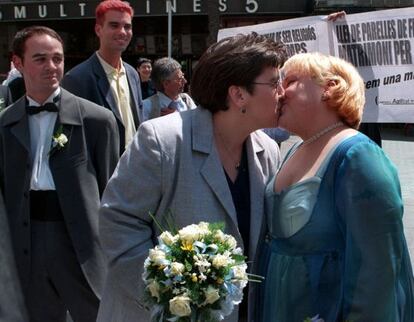The new meaning of marriage
Royal Academy's revised dictionary recognizes same-sex unions, "espanglish" and "frikis"

The Spanish Royal Academy (RAE) is moving with the times. For the latest update of its Royal Spanish Academy Dictionary (DRAE), the institution - together with the 22 academies that regulate the Spanish language around the world - is acknowledging the existence of frikis (geeks), blessing a new meaning of matrimonio (marriage) and introducing such new words as gayumbo (underpants) and canalillo (cleavage).
Moving closer to the digital world, the RAE is also recognizing los blogueros (bloggers) and tabletas (tablets), getting its head around espanglish (Spanglish) and embracing sociatas (Socialist Party supporters) and peperos (Popular Party supporters) alike.
In all, the RAE has amended 1,697 words to reflect everyday usage for the fifth revision of the DRAE since the 22nd edition was published in 2001. The sixth revision, already under way, will coincide with the publishing of the 23rd edition, due to be released in autumn 2014.
"The RAE does not promote words; it records what is established, what people use," says Darío Villanueva, RAE secretary and coordinator of the committees that put together the DRAE.
The RAE does not promote words, it records what is established"
One of the updates that most stands out in the revised dictionary is the new meaning of marriage: "In certain legislation, the union of two persons of the same sex, arranged via certain rites and legal formalities, in order to establish and maintain a partnership in life and interests." It marks an important advance in the wake of the debate that arose after the government of José Luis Rodríguez Zapatero in 2005 passed the law that recognized same-sex unions as marriages, a reform still pending a Popular Party appeal with the Constitutional Court.
Villanueva says the RAE has simply registered the generalized use and normalization of the meaning of the word. "Seven years since its legal passing, reality has adjusted to the new legislation and this meaning has started to circulate and filled up with references in different spheres," he says.
The unstoppable cross-pollination of words coming from the world of technology continues in the revised DRAE. This time the RAE is amending, officially recognizing or giving new meanings to words such as blog, bloguero, chat, SMS, tableta and USB.
The work has been done with the help of a computer database that allows the checking of records of a proposed word in different contexts, such as in the media, books, and the political sphere. At the end of the process, the committees debate the word and agree on a definition.
As for how long it takes to recognize or give the blessing to a new word, the RAE gives a deadline, or test period, of five years and verifies that it is no passing fad. Language and speech are alive and in perpetual evolution. Sometimes, Villanueva recalls, there are words that come into the language with force but later peter out. It happened with the word modem, which seemed full of life a few years ago but is now receding.
Space in the dictionary is limited to 90,000 entries, due to its print edition, which is the mother of all things lexical. However, this figure will increase in 2014.
The RAE has come in for criticism and mockery for the time it takes to recognize some words. In some cases, Villanueva says, it might be because the words pass unnoticed and nothing is done to make amends. That was the case, for instance, with gayumbo and canalillo. The delay in incorporating the word friki was because "it has come into force recently."
And espanglish? "It is a hybrid neologism that comes from the United States that reflects linguistic reality. It wasn't included in the 2001 dictionary because there wasn't a sufficient critical mass."
But the RAE is getting its act together to catch up with the present times. As for future new entries, prima de riesgo (risk premium), twitt and twitter are already ready to go.
Tu suscripción se está usando en otro dispositivo
¿Quieres añadir otro usuario a tu suscripción?
Si continúas leyendo en este dispositivo, no se podrá leer en el otro.
FlechaTu suscripción se está usando en otro dispositivo y solo puedes acceder a EL PAÍS desde un dispositivo a la vez.
Si quieres compartir tu cuenta, cambia tu suscripción a la modalidad Premium, así podrás añadir otro usuario. Cada uno accederá con su propia cuenta de email, lo que os permitirá personalizar vuestra experiencia en EL PAÍS.
En el caso de no saber quién está usando tu cuenta, te recomendamos cambiar tu contraseña aquí.
Si decides continuar compartiendo tu cuenta, este mensaje se mostrará en tu dispositivo y en el de la otra persona que está usando tu cuenta de forma indefinida, afectando a tu experiencia de lectura. Puedes consultar aquí los términos y condiciones de la suscripción digital.








































